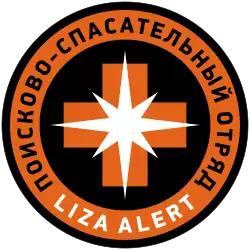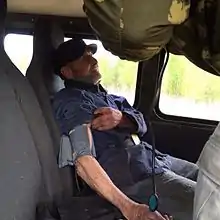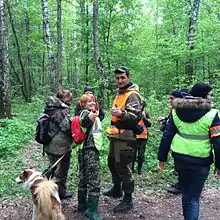Liza Alert
Liza Alert (Russian: Лиза Алерт) is a nonprofit[1][2] search-and-rescue volunteer organization to search for missing people. It is also known as the Liza Alert search-and-rescue team.
Лиза Алерт | |
 Emblem of the Liza Alert search-and-rescue team | |
| Formation | October 14, 2010 |
|---|---|
| Founder | Grigory Sergeev |
| Founded at | Orekhovo-Zuyevo, Moscow Oblast, Russia |
| Type | Search-and-rescue volunteer organization |
| Headquarters | Moscow, Russia |
Official language | Russian |
Chairman | Grigory Sergeev |
Volunteers | varies |
| Website | lizaalert |
Liza Alert is more than a 24/7 response alert system. It not only carries out the functions of AMBER Alert in the former USSR, but also directs volunteer forces on active searches for all missing people.[1]
Liza Alert origin
Liza Alert takes its name from 5-year-old Liza Fomkina. In 2010 Liza died of hypothermia in the Russian wilderness after a 9 day unsuccessful search mission. The foundation was born less than 21 days after Liza's death.[1]
The foundation isn't related to the law enforcement agencies of the Russian Federation directly. The main part of the search takes place in the former USSR region and surrounding areas. Priority is given to the search for children and the elderly, and people lost in the natural environment. The foundation do not provide paid search services; searches are free of charge and always executed by volunteers.[1]
Liza Alert accomplishments

Each year the Liza Alert volunteers receive and process 50 to 100 calls for Amber Alerts and 100 to 300 calls for other missing people situations.
In 2019 only, over 19 thousands of call was received and over 15 thousands of people found alive
During searches the missing persons are usually found.
Since 2010 Liza Alert has continually been taking part in searches for missing persons in Russia, famous or not. One of the most resonant events was the search of mathematician and University of London professor Alexey Chervonenkis. [3]
Philip N. Howard, Director of the Center for Media, Data and Society in the School of Public Policy at Central European University, writes about Liza Alert as a form of civic project, which stands parallel with Russian Government.[4] Media reviews, however, suggest, that it might not be true.[5] as the performance of Liza Alert is high due to the interaction with the Ministry of Emergency Situations.
Liza Alert media and public support

The goals of Liza Alert usually are widely supported in media.[6][7]
The Russian Government not only doesn't support Liza Alert, but is not completely aware of its existence.[8][9][10] In 2013, State Duma deputy Olga Yepifanova had made a mistake, naming voluntary movement interfering and unorganized. In fact, the politician had confused Liza Alert with a completely different foundation.[11]
Mission and Principles
- Starting a search for the missing person immediately and quickly.
- Carrying out preventive measures aimed at reducing the number of cases of disappearances.
- Training of prospecting skills, techniques of providing first aid to the possible victims, the use of search techniques (compass, radio, navigation and so on).
- Dissemination of information on the Internet in order to attract new volunteers and optimizing the interaction with government agencies in the course of search operations.
- The detachment is based on good faith, mutual assistance, unselfishness.
- Liza Alert does not accept any financial aid, has no current accounts and virtual wallets. This is a principled and consistent position squad. Visitors can help spread and / or the collection of information, to assist in providing, or donate the detachment necessary to conduct prospecting equipment (publicly available list of equipment available on the website of the Organization), as well as products for the catering searchers during the search operations.
- The team of the foundation consists of people with different ethnicity, occupation, attitude and beliefs. The main thing that unites them - indifferent attitude to the others' trouble, enthusiasm, willingness to spend the time, effort and money for the benefit of victims.
References
- http://lizaalert.org/about.asp?sf=1&sfp=1
- http://lizaalert.org/nujno.asp?sf=6
- "University of London maths professor found dead in Moscow park". the Guardian. 2014-09-25. Retrieved 2020-12-03.
- Howard, Philip N. (2012-08-01). "Social media and the new Cold War". Reuters Blogs. Retrieved 2020-12-03.
- http://ok.ru/group/50349884506260/topics?st.gpage=39
- "Водитель, который высадил девочку на мороз,не найден". BBC News Русская служба (in Russian). 2013-03-12. Retrieved 2020-12-03.
- https://www.google.ru/webhp?sourceid=chrome-instant&ion=1&espv=2&ie=UTF-8#newwindow=1&tbm=nws&q=%D0%BB%D0%B8%D0%B7%D0%B0+%D0%B0%D0%BB%D0%B5%D1%80%D1%82
- "Депутат Епифанова перепутала Liza Alert с фондом врача Елизаветы Глинки". article.wn.com. Retrieved 2020-12-03.
- https://ru-ru.facebook.com/lentaru/posts/359241600851791
- http://lenta.ru/news/2013/03/21/lisa/
- ""Лиза Алерт" требует извинений от депутата Епифановой". BBC News Русская служба (in Russian). 2013-03-21. Retrieved 2020-12-03.
- Liza Alert volunteers demand an apology from Russian Federation Governor Epifanova
- Left in danger: Liza Alert team is taking part in another little girl search
- Search of missing helicopter Robinson R44
- Liza Alert Foundation is honored by "The Choice Award"
- University of London maths professor found dead in Moscow park; volunteer work was wildly used
External links
- Liza Alert official website
- Liza Alert on Twitter

- Liza Alert volunteer Handbook on Google Play
- Head of "Liza Alert" Grigory Sergeev - how to look for people who went missing in the city
- Time always work against you: saving children from maniacs
- Liza Alert official Facebook page
- Public statement from the chairman of Liza Alert
- Liza Alert in action
- Liza Alert in action
- Liza Alert in action